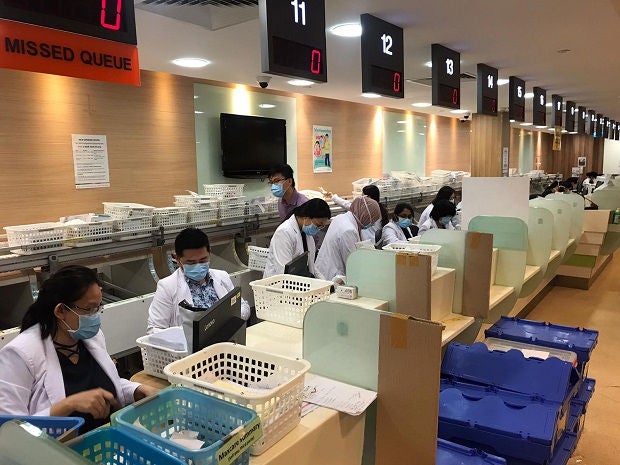
Block 3 Pharmacy was converted to a logistics centre for SGH’s Medication Delivery Service, which experienced increased demand due to COVID-19. Patients with non-urgent medical needs are urged to avoid visiting the hospital.
Remote consultations
Patients on warfarin need a regular blood test to check how quickly their blood clots. The warfarin dose is adjusted if clotting falls outside the standard measurement band known as the international normalised ratio (INR). The pharmacist-run Anticoagulation Clinic, or ACC, has a virtual component, where patients can leave after their blood test and have their INR result reviewed over the phone with a pharmacist a few days later. Their warfarin is then sent to their home via SGH’s Medication Delivery Service (MDS).
Just five to 10, mostly younger, patients used the virtual ACC each week before, said Senior Principal Clinical Pharmacist Kong Ming Chai, who leads a pharmacy team seeing about 100 patients a week on the blood-thinning drug. Since the COVID-19 crisis, the number using the virtual ACC has gone up by 50 to 90 a week, he said.
The Rheumatology Monitoring Clinic, another pharmacistled clinic, started offering teleconsultations during the circuit breaker period. Patients visit SGH or SingHealth Polyclinics for their blood tests and review the results via the phone a few days later, said Mr Lim Teong Guan, Senior Principal Clinical Pharmacist.
Besides patients from these clinics, those whose long-term conditions are stable and have their reviews postponed can opt for MDS. With fewer patients visiting the specialist outpatient clinics (SOCs) at Block 3, the pharmacy next to the row of SOCs was closed and converted to a logistics centre for medicine delivery.
According to Ms Nah Szu Chin, Principal Pharmacist, demand for MDS doubled during the circuit breaker period from the usual 2,500 requests a month. Ms Nah, who is charge of the service, said more staff were stationed at the pharmacy, especially on Sundays, to help process orders.
UV to decontaminate
Two cleaning machines using UV-C, a short-wavelength, ultraviolet light that breaks apart germ DNA, have been at SGH since end-2017. But with the pandemic and more wards used to isolate COVID-19 patients, four more machines were deployed.
Dr Ling Moi Lin, Director of Infection Prevention and Epidemiology, had learnt of the technology much earlier on, but was unable to find a distributor for the machines in Singapore for five years. Although regular hospital cleaning is sufficient, UV-C is adept at decontaminating and reducing transmission of superbugs.
“Our staff seem to think it’s a super machine that kills all pathogens. While it is true that UV-C kills all surface microorganisms, we are mindful that there is no single process that can guarantee 100 per cent pathogen eradication,” said Dr Ling, noting that the automated UV-C machines disinfect areas six times faster than manual cleaning.
In isolation
The sight of a Muslim migrant worker praying without his customary prayer mat moved Senior Nurse Manager Suriana Sanwasi so deeply that she rallied her family, friends, and colleagues for help. Digging into their pockets, they bought toiletries, towels, and snacks.
Before long, their efforts grew multifold as contributions poured in. In one instance, 50 families sent clothes, prayer mats, toiletries, and towels for the migrant workers. After their nursing shifts, Ms Suriana and her colleagues sorted and packed the items. Before transferring to community facilities, migrant workers need fresh clothes to reduce the risk of transmitting the virus, said Ms Suriana.
The heartwarming efforts of Ms Suriana and her friends came to the fore when Mr Amin Amrin, Senior Parliamentary Secretary for Health, posted their story on his Facebook page.













 Get it on Google Play
Get it on Google Play